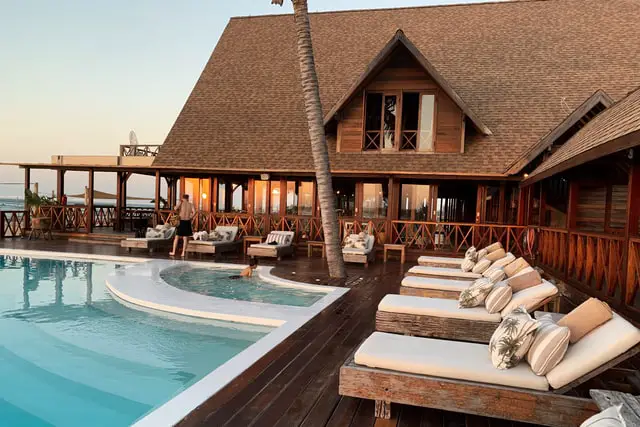If you’re considering starting a boutique hotel or maybe acquiring one, you might be asking yourself are boutique hotels profitable?
This would be a legitimate question because like all businesses some boutique hotels are very profitable while others never make a dime and eventually disappear.
Over the years, boutique hotels have grown in popularity and have been popping up everywhere offering special experiences that guests love. With their unique style, intimate atmosphere, and personalized experiences they have become a much-needed antidote to big-chain, franchisee hotels with no personality and no character.
But are boutique hotels profitable? That’s the question. All the charm and character in the world is of no use if a hotel doesn’t turn a profit.
In this article, we’ll take a look at five things you need to know about the profitability of boutique hotels. We’ll also provide some tips on how you can make your boutique hotel more profitable.
So, if you’re thinking of opening a boutique hotel, or if you already have one, read on!

What is a Boutique Hotel?
A Boutique Hotel is a small hotel, usually with between ten and one hundred rooms, that offers guests an intimate, unique and personalized experience.
Boutique Hotels are often located in historic buildings or converted residences, which gives them their unique character. They are also known for their excellent service, creative design, and stylish decor.
Boutique hotels also tend to have a more relaxed and informal atmosphere than larger chain hotels. They are often run by their owners, who take a personal interest and great pride in ensuring that each guest has a wonderful stay.
When Are Boutique Hotels Profitable?
Like all hotels, a boutique hotel’s profitability is linked to room rates, occupancy rates, operating expenses, and depreciation.
Boutique hotels are profitable when they are able to balance these four variables in their favor.
Room Rates
Room rates are a very important factor in determining a hotel’s profitability. Boutique hotels usually charge more than traditional chain hotels as they offer special and unique experiences. But they also charge more because they usually have fewer rooms than traditional hotels and so each room needs to generate enough revenue to be able to cover costs and be profitable.
Occupancy Rates
Occupancy rates are also critical for a boutique hotel’s profitability. Higher occupancy rates mean that fixed costs like electricity, maintenance, heating, and staff can be amortized over a large revenue base. A successful hotel needs to find the right balance between room rates and occupancy rates to maximize revenue.
Operating Costs
Like all businesses, Boutique hotels also need to be mindful of their operating costs. They typically have higher labor costs than chain hotels because they employ more staff per room and offer a more personalized service. Also, if boutique hotels are in very touristic locations, they may have higher than average labor costs, and may they may need to pay higher taxes.
Depreciation
And finally, the depreciation costs will depend on how much long-term investment has gone into the boutique hotel – either during its acquisition or subsequently during its operation for things like renovations and extensions. Boutique hotels are often located on old properties and so have high capital expenditures associated with them thus raising the annual depreciation expense on the books which in turn affects net profitability.

5 Strategies to Improve Boutique Hotel Profitability
In the previous section, we reviewed the four factors that affect a boutique hotel’s profitability: Room Rates, Occupancy Rates, Operating Costs and Depreciation.
The question now is how do you affect these factors for the better? How far can you raise Room Rates? How can you improve Occupancy Rates? And how can you lower Operating Costs and the Depreciation Expense?
Here are 5 tips on how to positively impact each of these factors and help improve a boutique hotel’s profitability.
- Offer premium experiences
- Understand your most lucrative market segments
- Be focussed with your marketing efforts
- Negotiate better deals with suppliers
- Look for efficiency gains in operations.
1. Offer premium experiences
The way to charge premium room rates is to offer premium experiences. When people look for a boutique hotel they are looking for more than just a place to spend the night. They are looking for unforgettable experiences.
They can get a standard hotel room anywhere. What they are looking for is something special. So focus on delivering special experiences that guests cannot find at other hotels and for which they will always remember your hotel.
Some examples of premium experiences include :
- A welcome bottle of champagne in the room
- A private tour of the city
- An intimate dinner for two in the hotel restaurant
- A couple’s massage at the hotel spa
- Tickets to a show or a concert
The options are endless. Be creative and focus on delivering an experience that is unique and memorable. And in return, you will be able to charge higher room rates.
2. Understand the most lucrative market segments
Not all market segments are created equal. Some are more profitable than others. And when it comes to boutique hotels, some will care about the experience they have while others will just want a bed for the night.
So when it comes to targeting market segments, boutique hotels should focus on travelers who are looking for premium experiences and are willing to pay more for them.
Remember, these are also the guests who will help drive up occupancy rates. Conduct market surveys to identify these segments and then focus your marketing efforts on them.
3. Be focussed with your marketing efforts
The next tip is to focus your marketing efforts. When you are a small boutique hotel, you cannot afford to market to everyone. You need to be very strategic in how you allocate your limited marketing budget.
First, identify the most lucrative market segments as we discussed in the previous tip. Then, focus your efforts on the channels that will help you reach these target market segments.
Think about what kind of experiences they are looking for and then craft a marketing message that resonates with them. Also, consider using targeted online ads and social media campaigns to reach these guests where they are spending most of their time online.
4. Negotiate better deals with suppliers
One of the biggest factors that helps determine profitability is the hotel’s operating costs.
The lower the costs, the more profitable the hotel will be and one of the best ways to reduce operating costs is to negotiate better deals with suppliers. This may be possible if you have a good relationship with them or if they are able to offer you volume discounts. You could also offer long-term contracts in exchange for lower prices.
And if that doesn’t work, look for new suppliers. There is always someone new on the market looking for a break and willing to give discounted prices in return.
5. Look for efficiency gains in operations
Finally, you should always be looking for ways to improve efficiency in your operations. Are there areas where you can cut costs without compromising on quality? This could be anything from streamlining your housekeeping operations to automating your reservations system.
If you can find even small efficiency gains, it will have a big impact on your bottom line. And that is what it all comes down to in the end – profitability.
Summary
As the world reopens after the Covid-19 pandemic, boutique hotels are poised to see a rebound. The pent-up demand for travel will drive more and more people in the direction of boutique hotels.
So when we ask the question – Are boutique hotels profitable? – the answer is, they surely can be. The devil (as usual) lies in the details. Boutique hotels that can balance room rates, occupancy rates, operating expenses, and depreciation will stand a better chance of being profitable compared to those that cannot.
Boutique Hotel owners and managers should look for ways to maximize room rates and occupancy rates. And they should find ways to minimize operating and depreciation costs.
They should offer premium experiences for which they can charge premium room rates. Premium experiences can also drive higher occupancy rates as more and more people look for special and memorable experiences. They should be clear about who their target market is and have a laser-like focus to channel their marketing efforts towards this target market. To lower costs, they should negotiate with all suppliers and find efficiency gains in every operational aspect of running the hotel.
Finding profitability in a boutique hotel is a balancing act between delivering amazing experiences to guests, charging the maximum prices you can get away with, and keeping all expenditures down without affecting the quality of your service.
